

Mobile commerce to continue rapid growth in 2016 - Tech News. KUALA LUMPUR: M-commerce continues to surge globally – last year, 28% of the 4.9 billion payments that digital payment provider PayPal processed were from mobile devices.
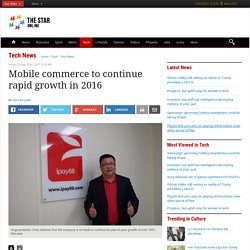
Meanwhile, local online payment gateway provider iPay88 said that in 2015, the number of online shoppers buying with mobile devices was 3.7 million, compared to only two million in 2014. In the first quarter of this year, the company recorded 1.6 million purchases with mobile devices, said iPay88's executive director Chan Kok Long. Chan pointed out that the trend is largely due to the high mobile penetration rate in Malaysia which reached 136% in 2015, with almost half of all Malaysians using their smartphones to shop online.
“The availability of cheap smartphones and laptops have made the Internet accessible to a whole new demographic. Malaysia Social Media Statistics 2014. 1395803380. E-Commerce History & Milestones in Malaysia. May 20, 2013 CK Wong Category : ecommerce , macro , malaysia To start the first post in ecommerce.milo, it couldn't have been more appropriate to start with the development and milestones of e-commerce in Malaysia.
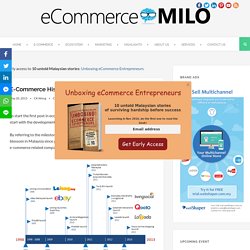
By referring to the milestones chart below, e-commerce seems to be only started to blossom in Malaysia since year 2011. It is also the year in which more foreign e-commerce related companies started venturing into local market. Malaysia’s e-commerce ‘penetration’ to double in 2016: iPay88. Transaction volume doubled in 2015, 63% growth expected this yearAims to grow merchant base from 8,300 to 10,000 too DESPITE the economic gloom, with GDP (gross domestic products) growth expected to slow down, Kuala Lumpur-based online payment systems provider iPay88 Sdn Bhd believes that the e-commerce sector in Malaysia is poised for “strong growth” in 2016.
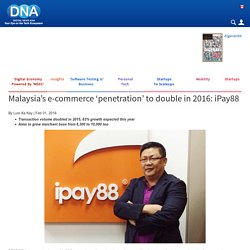
The time is ripe, with domestic market demand “well-supported by wide and stable online connectivity and broadband solutions,” according to its cofounder and executive director Chan Kok Long (pic above). E-commerce set for growth - SMEBiz News. Improved Internet access, high mobile penetration and enhanced security augur well for e-commerce growth in Malaysia in 2016, says CEO of online marketplace, 11street.
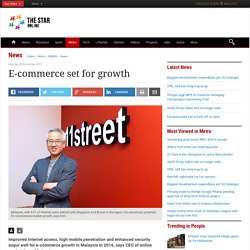
THE e-commerce market in Malaysia is poised to flourish next year and beyond with better mobility, improved Internet and enhanced security, says an industry player. Online marketplace 11street chief executive officer Hoseok Kim notes that Malaysia’s e-commerce market size has seen a 31% increase in compound annual growth rate from 2010 to 2014, and expects a similar growth rate in the coming years with the local e-commerce hitting US$3.1bil by 2018. “There are a total of 252.4 million Internet users around South-East Asia, with Malaysia emerging as the third country that recorded the highest percentage of Internet users at 67% after Singapore and Brunei.
“The promising Internet penetration indicates Malaysia’s enormous potential for e-commerce market growth,” he says. Asians flock to social networks for shopping sprees. Image copyright Dora Soh Singaporean student Dora Soh posts her "outfit of the day" online every day, to connect with fellow fashionistas and inspire her nearly 10,000 followers on Instagram.
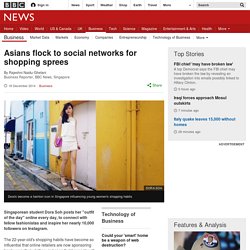
The 22-year-old's shopping habits have become so influential that online retailers are now sponsoring her to wear their clothes, in hopes that her posts will boost their brand and sales. "On social media, I can interact with strangers and share fashion inspiration by following their accounts and liking their photos," Ms Soh says. While this sounds like a simple formula to keep up with the latest fashion trends, the avid shopper is at the forefront of a rapidly growing business in Asia - social shopping.
Your Personal Online Closet and a Fashion Social Network. How social media is transforming the fashion industry. Image copyright Brooklyn Beckham/Burberry When Brooklyn Beckham revealed on his Instagram feed that he would be photographing Burberry's latest fragrance ad campaign, the outrage was palpable.
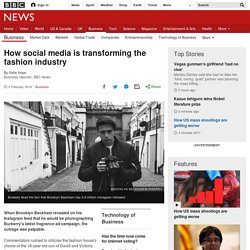
Going forward with the GST in fashion - Fashion. The introduction of the new tax system is expected to have an impact on style.
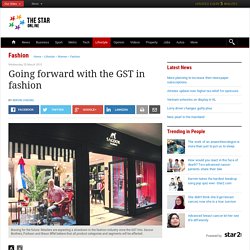
YOU can always count on certain fashion items to remain as staples over the years. One very good example is the classic “little black dress” that every woman surely has in her wardrobe. That said, not everything stays the same. The cost of looking stylish, for instance, goes up as time passes. The Unexpected Costs of Being a Fashion Blogger. Fashion blogging sounds like a pretty sweet gig, right?
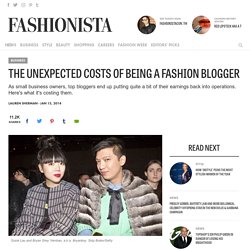
How fun would it be to sit front row at the shows, be flown by brands to exotic locales for events and spend a good chunk of your time playing dress up while your boyfriend snaps photos of your outfit combinations? And while fashion blogging is all of those things in the eyes of many, it's also a profession for a select few. As one rises up the blogging ranks, the job becomes a job -- with real responsibilities. And a significant amount of expenses. There's no denying that bloggers do score a lot of free stuff, as well as fancy dinners and five and six-figure advertising and marketing deals.
How do bloggers earn from blogging (Nuffnang)? Well, I guess you can probably tell what I'm going to blog about today - my title said it all.
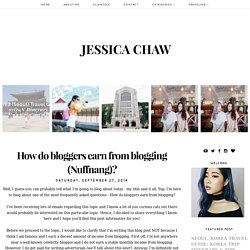
Yup, I'm here to blog about one of the most frequently asked questions - How do bloggers earn from blogging? I've been receiving lots of emails regarding this topic and I know a lot of you curious cats out there would probably be interested on this particular topic. Hence, I decided to share everything I know here and I hope you'll find this post informative for you! Before we proceed to the topic, I would like to clarify that I'm writing this blog post NOT because I think I am famous and I earn a decent amount of income from blogging. First off, I'm not anywhere near a well-known celebrity blogger and I do not earn a stable monthly income from blogging.
Top Female Bloggers-Turned-Entrepreneurs In Malaysia. Unlike the baby boomers, instead of gaining work experience while taking an entry-level job in big companies, the Generation Y have creative and innovative ways to earn their income—by being an entrepreneur.

According to the Concise Oxford English Dictionary, the real definition of an entrepreneur is “a person who sets up a business or businesses, taking on financial risks in the hope of profit”. Women Who Changed Fashion: The New Media - Harper's Bazaar Malaysia. Image: BFA Fashion thrives off of everything new, which means bloggers, digital leaders, and brand personalities dictate the ever-evolving style world. From the original bloggers who created the hunger for content to an editor who took old-school magazine skills and applied them to new technology, these women embody a new approach to editorial content and technology. #1.
Fashion bloggers: the new face of digital campaigns. It’s that time of year again when Christmas party dresses are at the forefront of women’s priorities as they seek to look their best at work functions and special family dinners. Many retailers are turning to fashion bloggers to promote their party wear and A/W collections through interactive campaigns. Online influence has become a valuable tool for the bloggers of today and whether they are modelling A/W party dresses, attending photo shoots or inspiring outfits on the street from London to Kuala Lumpur, the rise of the everyday fashion blogger should not be underestimated. While most blogs begin as hobbies, many bloggers have turned their past-time into a career, in some instances earning up to six-figure sums – although this trend has yet to become widespread in the UK. Kat Griffin of Corporette in the US gave up her highly paid position as a lawyer to blog on a full-time basis, and she now receives 130,000 unique visits each month.
Buro 24/7 Malaysia Digital Awards 2016: Vote for your favourite influencer, Buro 24/7. Between creating our very own Buro 24/7 Softsrve and the #BuroLovesGiving Charity Market, sending out the #BuroLovesGiving gift boxes and delivering buckets of #BuroLovesMoet, organising a Buro 24/7 Malaysia x SK-II Mother's Day Afternoon Tea at The Ritz-Carlton Kuala Lumpur and a Buro 24/7 Malaysia x Benefit Brow Party, we've had all cylinders firing since our launch party.
And come July, we'll be turning ONE (#BuroTurnsOne) and to celebrate, we're launching the first ever Buro 24/7 Malaysia Digital Awards. The evolution of a professional blogger - Business Circle. There are many professional bloggers in Malaysia, that is those whose main profession is blogging. Are Fashion Blogs Effective Marketing Tools For Luxury Brands? - Luxury Society - Digital. Media Matters Research Report. Measuring Blog Influence. Birmingham City University - Sign In. The Biggest Influencer in Consumer Purchase Decisions? There’s a lot of discussion about the ever-changing evolution of sales strategy. This evolution is strongly driven by one important factor – the customer. Have you ever wanted to know why people buy? And what influences consumer purchase decisions? People generally buy your product and service in order to satisfy one of two main needs: Pleasure and enjoyment.Avoidance of pain or loss via solving a problem.
For Young Brands, Is the Instagram Opportunity Shrinking? LONDON, United Kingdom — When Andrew Jennings launched minimalist watch brand Larsson & Jennings in April 2012, Instagram was still young. Only 18 months after launch, with 30 million users (a fraction of its current user base, which exceeds half a billion people), the platform had just been acquired by Facebook. But Jennings was quick to identify its potential for driving buzz and sales for his fledgling direct-to-consumer brand without a large marketing budget. Ecommerce: Social Media. Bloggers vs 'influencers': who rules fashion's social universe?
Why Digital Influencers Are Winning the Battle for Consumer Trust. Quietly, marketing has undergone an enormous power shift in recent years, driven by consumers’ demand for more authenticity from brands. While a rise in the application of quantitative methods like big data and marketing technology has dominated the collective mind-space of marketers, a more qualitative shift has also occurred, highlighting the changing trend in consumer trust that marketers must address: “Digital influencers have become more powerful than traditional celebrities.” Sounds crazy, right? However, it makes sense when you consider that modern consumers expect authentic brand relationships, and therefore value the input of influencers that they trust over celebrities that have a perceived monetary relationship to promote products and brands.